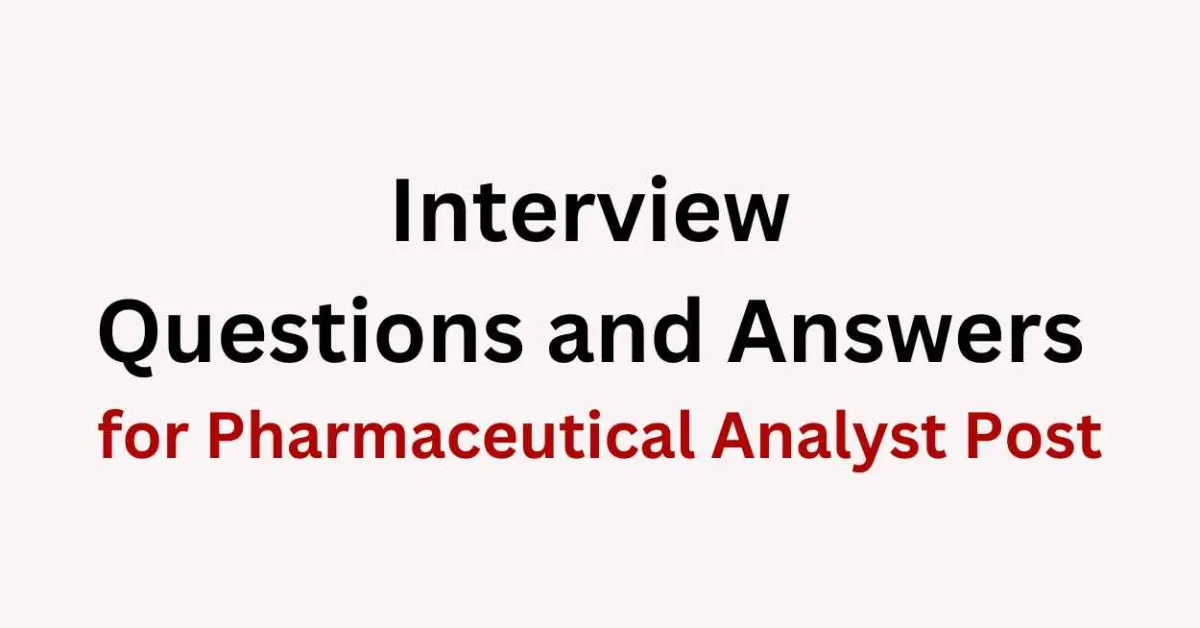A pharmaceutical analyst is a professional who works in the pharmaceutical industry and is responsible for performing various tests and analyses on drugs and drug products. Pharmaceutical analysts work in quality control (QC) or research and development (R&D) departments of pharmaceutical companies.
In QC, pharmaceutical analysts are responsible for testing the quality of raw materials, in-process samples, finished products, and stability samples. They use a variety of analytical techniques, such as high-performance liquid chromatography (HPLC), gas chromatography (GC), spectroscopy, and dissolution testing, to ensure that drugs and drug products meet regulatory requirements and internal quality standards. They also generate and review test results and maintain accurate and complete documentation.
In R&D, pharmaceutical analysts are responsible for developing and validating analytical methods for drug substances and drug products. They work closely with chemists and other scientists to ensure that new drugs are developed with high quality and in compliance with regulatory requirements. They also optimize existing methods, troubleshoot analytical issues, and ensure that methods are transferable to manufacturing sites.
Pharmaceutical analysts must have strong analytical and problem-solving skills, as well as a good understanding of regulatory requirements and quality systems. They must also be able to work independently and as part of a team, and have excellent communication skills to collaborate with other departments and external partners. A degree in chemistry, biochemistry, pharmaceutical sciences, or a related field is typically required for a career as a pharmaceutical analyst.
Que: What motivated you to pursue a career as a pharmaceutical analyst?
Ans: As a pharmaceutical analyst, I am driven by my passion for science and medicine. I have always been interested in how drugs are developed and how they work, and I find it fascinating to be able to contribute to this process by analyzing data and developing new formulations.
Que: What experience do you have in pharmaceutical analysis?
Ans: I have worked as a pharmaceutical analyst for several years, during which time I have gained experience in a range of analytical techniques, including HPLC, GC, IR, and UV-Vis spectroscopy. I have also worked with a variety of drug delivery systems, such as oral solids, injectables, and topical creams.
Que: How do you ensure accuracy in your analytical results?
Ans: To ensure accuracy in my analytical results, I follow strict standard operating procedures (SOPs) and validate my methods using appropriate statistical techniques. I also regularly perform quality control checks and use calibration standards to confirm the accuracy and precision of my instruments.
Que: How do you stay up-to-date with new developments in the pharmaceutical industry?
Ans: I stay up-to-date with new developments in the pharmaceutical industry by regularly attending conferences and seminars, reading industry publications, and networking with other professionals in the field. I am also a member of professional organizations such as the American Association of Pharmaceutical Scientists, which provides access to the latest research and industry trends.
Que: Can you describe a time when you had to troubleshoot an issue with an analytical method?
Ans: Yes, in my previous role, I encountered an issue with an HPLC method where the results were inconsistent and not reproducible. I reviewed the method and found that the column was contaminated, which was affecting the separation of the compounds. I replaced the column, cleaned the instrument, and re-validated the method. This resolved the issue and allowed us to continue with our analysis.
Que: How do you ensure regulatory compliance in your work?
Ans: I ensure regulatory compliance in my work by following all applicable guidelines and regulations, such as Good Laboratory Practices (GLP) and Good Manufacturing Practices (GMP). I also maintain accurate records of my work and ensure that all data is properly documented and stored. Additionally, I stay up-to-date with regulatory changes and attend training sessions to ensure that I am aware of any new requirements or guidelines.
Que: Can you describe a project you worked on that you are particularly proud of?
Ans : Yes, I worked on a project where we developed a new drug delivery system for a cancer treatment that was able to increase the bioavailability of the drug while minimizing its side effects. We used a combination of analytical techniques, including HPLC and LC-MS, to analyze the drug's pharmacokinetics and ensure that it was being delivered to the targeted area. I was proud to be a part of this project, as it had the potential to make a significant impact on patients' lives.









